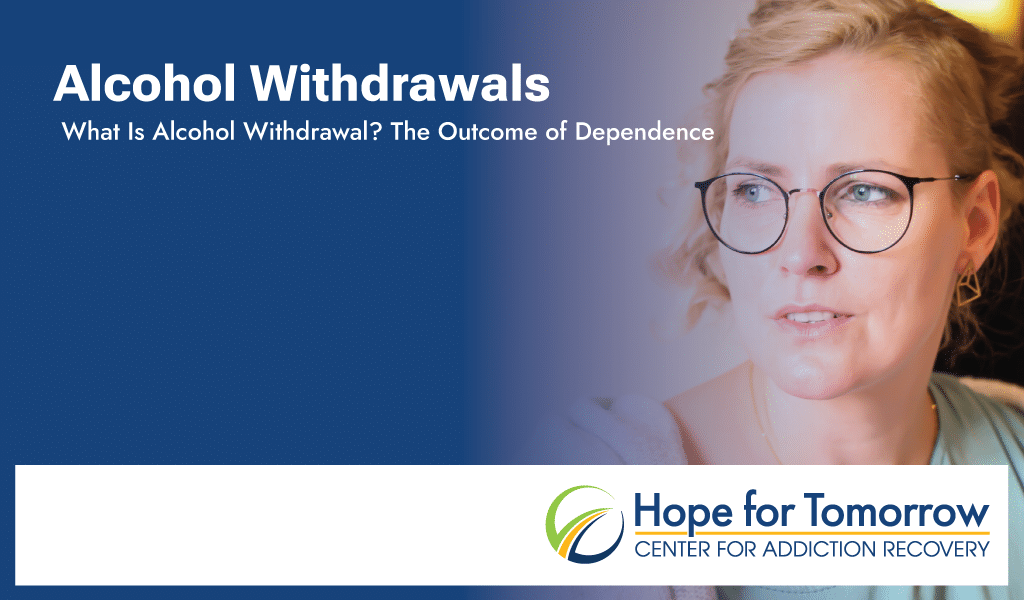

Sometimes people throw around the word “withdrawal” lightly. Have you ever heard someone joke about going through withdrawal after a concert they enjoyed or giving up a beloved food because of a diet? It’s easy to say, but not easy to experience. Those who go through alcohol withdrawal firsthand can tell you that. Maybe you’re one of them.
Alcohol withdrawals are far less understood than hangovers, which many people consider a staple of alcohol use. Around 3.8% of West Virginians have an alcohol use disorder, but some people still don’t know about the withdrawal that can come along with it. At Hope for Tomorrow, we know how challenging alcohol withdrawal can be, and we help people get through it every day. To fight through withdrawal and overcome an alcohol use disorder, it’s important to know what you’re dealing with, and how to get help. We’ll cover that and more in this blog.
Alcohol withdrawal, also known as alcohol withdrawal syndrome (AWS), happens when you stop drinking alcohol after your body is used to it being in your system. When the brain becomes dependent on alcohol after long-term use, you’ll experience uncomfortable complications.
Going through alcohol withdrawal doesn’t necessarily depend on how much you drink. Alcohol withdrawal occurs most commonly in people who drink heavily for a long time. The type of alcohol can influence the severity of withdrawal, too – red wine, for example, has antioxidants that can make symptoms less severe. Beyond that, it depends largely on your genetics, age, body composition, and any other health conditions you have.
Knowing the signs of alcohol withdrawal is important, both so you can differentiate between withdrawal and another illness, and because it’s a sign of a potential alcohol use disorder. Everyone’s experience with withdrawal will be different, but these are the most common symptoms:
The most serious alcohol withdrawal symptom is called delirium tremens (DTs). It consists of severe confusion, extreme agitation, hallucinations, seizures, high blood pressure, and fever. While rare, DTs are a medical emergency, and if you or someone you know experiences these symptoms, seek medical help immediately.
Just like the symptoms, the timeline and withdrawal experience will vary based on each individual and their situation, but there is a general timeline to use as a reference.
Six hours after your last drink, you may begin experiencing mild withdrawal symptoms, like headache, nausea, shaky hands, and anxiety.
12-24 hours after your last drink, symptoms will become more noticeable. Mild symptoms may become more severe, and you also might experience insomnia, sweating, nightmares, depression, and trouble concentrating.
24-72 hours after your last drink, symptoms will peak. This is when symptoms of DTs could surface. You may vomit, have seizures, or hallucinate.
Three days after your last drink, withdrawal will start to subside. You’ll start to feel better, and within a week, most people feel normal again.
Some people don’t, though. It’s rare, but symptoms can continue for weeks for some people. This is called post-acute withdrawal syndrome (PAWS). Symptoms of PAWS include anxiety, irritability, depression, cognitive dysfunction, fatigue, trouble sleeping, and alcohol cravings.
Even though symptoms might linger for longer in some people, with alcohol detox and treatment, they almost always go away.

When you drink alcohol, it impacts two of your brain’s neurotransmitters: GABA and glutamate. GABA is an inhibitory neurotransmitter, meaning it calms your system down. Glutamate is the opposite – it’s excitatory and helps with cognitive function and mood regulation. Alcohol enhances GABA and inhibits glutamate, which slows your brain communications down.
Your body and brain want to keep everything in balance, though, so the brain produces less GABA and more glutamate to try to compensate for alcohol’s effects. As it does this, it increases your tolerance to alcohol, and you’ll need to drink more to counteract the body’s natural re-balancing and achieve the same effects as before.
When you stop drinking altogether, your brain still produces less GABA and glutamate. This means your body is stuck in an “excited” state without alcohol, causing withdrawal symptoms. To experience withdrawal symptoms, your body needs to get to that point of making less GABA and more glutamate, which is why withdrawal usually only happens after you’ve been drinking for a long time.
There are no official tests to diagnose alcohol withdrawal, but if you see a doctor about your symptoms, they’ll ask you about your drinking habits. Questions will include how long you’ve been drinking and when you stopped drinking. They’ll also examine you so they can rule out any other health conditions that may cause your symptoms. If there are no other issues, and you’ve been drinking consistently and recently stopped, they’ll likely diagnose you with alcohol withdrawal syndrome.
The only way to prevent alcohol withdrawal is to monitor your drinking and seek alcohol addiction treatment if you feel like your relationship with alcohol has become unhealthy.
Treatment will start with an inpatient alcohol detox, where you and your withdrawal symptoms will be closely monitored by qualified medical professionals 24/7. They’ll ensure the withdrawal process happens safely and goes as smoothly as possible. You may receive benzodiazepines or other medication to manage your symptoms, or intravenous fluids if you’re dehydrated.
After you complete medical detox, it’s recommended that you continue to a residential program. There, you’ll continue to receive constant care as you undergo further treatment for an alcohol use disorder. You’ll attend therapy sessions to get to the root of the condition and help you heal from any stress or trauma that triggers your alcohol use. This step is really important, because without dealing with underlying mental health concerns, you may just return to alcohol use. Full and comprehensive treatment will give you the best chance at long-term recovery.
Next, it’s a good idea to continue into an outpatient program. During outpatient treatment, you’ll be able to continue receiving care while returning to your normal responsibilities instead of staying at a treatment facility constantly. You can customize your care to your schedule, and continue therapy to keep you on track in your recovery. Support groups and 12-step meetings like AA are also great resources for anyone in recovery from an alcohol use disorder.

Alcohol withdrawal is painful and unpleasant, and isn’t something someone should try to cope with alone. Even if you have a good support system around you, if you continue drinking, you’ll be stuck in a cycle of alcohol use and unwanted symptoms.
When you stop drinking and overcome withdrawal, an alcohol-free life is waiting for you. That life is better. Your hair will be stronger/shinier, your dental health will improve, you’ll sleep better, and your liver health will greatly improve, among so many other things.
If you’re tired of trying to stop drinking only to get sick every time, or you’ve witnessed a loved one continuously fall back on alcohol after trying to endure withdrawal, it’s time to consider treatment.
Hope for Tomorrow is an addiction recovery center with locations in Point Pleasant and Beckley, West Virginia. We’re passionate about offering every patient the quality care they deserve, and we’ll support you from the moment you walk through our doors and well after you leave us. We offer a continued care program after treatment is complete so you never have to go through recovery alone. For more on our services, contact us at 877-679-8162.
Treatment today for a brighter tomorrow.